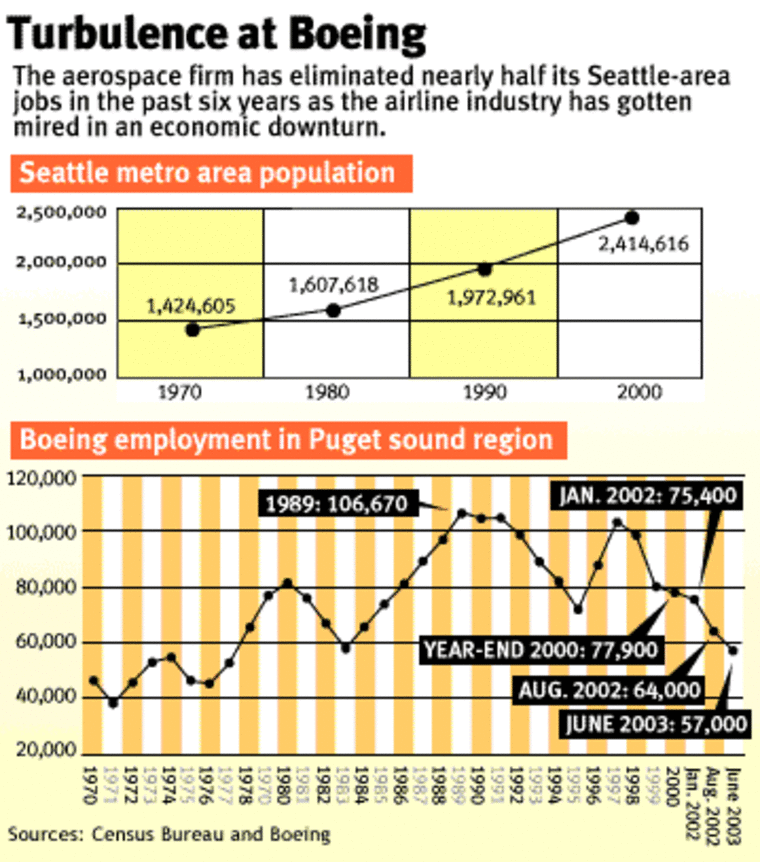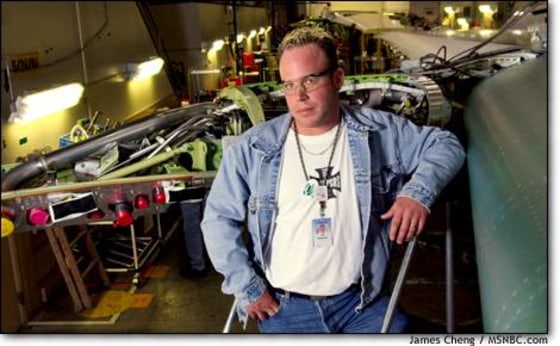For a guy who was washing cars for a living six years ago, Jim Roberts has done pretty well for himself. He has a good job at Boeing, owns a three-bedroom home in suburban Seattle and manages to save money from every paycheck. Still, sometimes the 37-year-old factory worker feels the weight of the world on his shoulders.
One night several weeks ago, Roberts came home from working the second shift at Boeing’s sprawling 737 plant south of Seattle and found himself unable to relax. Soon he began dwelling on things: His busy schedule for the week, his responsibilities as a union shop steward, and his two young children, including a son with Down syndrome.
His heart began racing, and he wondered if it might be a heart attack. Shortly after 2 a.m., he drove himself to a nearby hospital. Roberts had been to the emergency room before with similar symptoms; this time he returned with a thick packet of information on panic attacks.
Roberts was surprised, even shocked, by the diagnosis. He considers himself a pretty laid-back guy, the mellowest father on the playground. But he acknowledges a streak of intensity, whether playing paintball in a weekend tournament or reporting for his job, which involves coordinating parts for airplane wing assembly.
“I’m a young guy — I don’t have a lot of seniority at Boeing,” he said. “I’ve still got faith that it’s the best thing out there. I’m one of the few guys that comes into work, and I’m excited. I say, ‘Let’s get in there and build some planes.’ If we drop the ball we’re slowing down the production line. And I put it on my shoulders that I refuse to allow that to happen.”

So what’s his biggest worry? That’s an easy one: Job security. With the airline industry mired in a global downturn, Boeing has eliminated more than 20,000 jobs in the Seattle area in the past three years, or 25 percent of the total. Boeing is still the region’s biggest private-sector employer by far, but the aviation giant has set off a frenzy of activity here and across the country by declaring it might not build its next-generation 7E7 passenger jet in Washington state, where it has done its commercial airplane assembly since the company was founded in 1916.
Roberts fears that if Boeing decides to build a new plant elsewhere, it could be the beginning of the end for the steady supply of well-paying blue-collar jobs that have formed the region’s economic bedrock for decades.
It’s hardly an unfounded fear. While the Seattle economy is far more diversified than it was during the region’s deep recession of the 1970s, the company still wields immense economic clout, with each Boeing job creating two additional jobs in the state through a multiplier effect, said Dick Conway, a local economic forecaster.

“Given its size and its volatility, it still has the unique ability to swing our growth rate in economic cycles,” Conway said. “We’ve been struggling with our worst recession in 30 years. Boeing has contributed to all that mightily.”
State lawmakers, stung by Boeing’s decision to move its world headquarters from Seattle to Chicago in 2001, recently held a special legislative session to offer tax breaks valued at more than $3 billion over 20 years in an effort to lure the 7E7 project and its estimated 1,200 local jobs. Washington will compete with dozens of locations in at least 11 other states vying for the project, which will only be built if Boeing can drum up enough interest among airline customers. A decision is expected by the end of the year.
For his part, Roberts is promoting a Machinists union campaign — called “We Can Do It” — to boost public support for Boeing and the 7E7.
“I don’t really know how to word this, but we have one more crop of fruit on the branch,” he said. “Once that branch is cut off, that work goes away. We’ll still have that one crop, but once that’s gone there won’t be another one. I just really feel that if we don’t land (the 7E7), we’re going to be in a serious world of hurt.”
Roberts, who had an auto-detailing business before he hired on with Boeing, probably would have been laid off himself by now were it not for his status as a union-appointed shop steward, which affords him extra seniority. Even so, he came close to losing his position last year in a consolidation of jobs. Roberts makes no apologies for his protected union status, saying he volunteered to be a shop steward when times were flush and few wanted the hassle of the job, which carries token payment of $300 a year.
A recent cost-of-living increase pushed Roberts’ salary just past $20 an hour, and the factory worker plans carefully to make the most of his income. His 1991 Ford Ranger has more than 200,000 miles on it, and his wife, Mary, tools around in a 1997 Dodge Neon that is fully paid for. Roberts says he puts aside 15 percent of his pretax income into a company-sponsored retirement plan and another $400 a month into savings for potential emergencies. Family vacations are limited mainly to weekend camping trips, paid for out of loose change scattered in jars around the house. Roberts is actively involved in a weekend paintball team, but all his equipment is supplied by a sponsor.
“We’re responsible about (saving money),” he said. “We’re not going to be one of those families that something is going to happen and we’re going to lose everything. We’ve taken the right steps where if something happens, things will be taken care of.”
